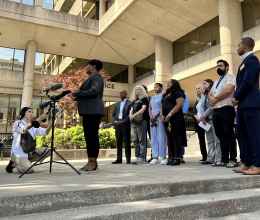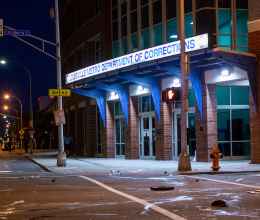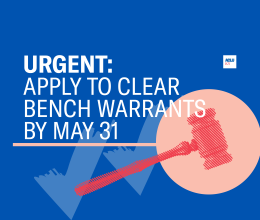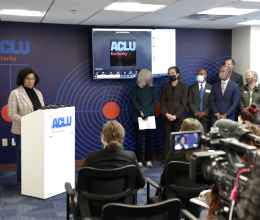
Roughly 150 people were able to clear active bench warrants and stop living with the fear of arrest thanks to a special amnesty period in Jefferson County District Court.
This opportunity allowed some people to reschedule or clear their case with no concerns about being arrested. This important program is one step in addressing the deadly overcrowding in Louisville jails, where eight people have died in as many months.
Alongside our community partners, we knocked on doors, mailed postcards, and ran ads in English and Spanish to spread the word and encourage people to utilize this program. Our efforts resulted in roughly 150 people applying and more than 100 people finding resolution for their cases. The court even added an extra day to their docket because so many people applied. People with certain non-violent misdemeanor and class D felony charges were eligible.
We also worked with partners to meet applicants at the Hall of Justice to help them navigate the legal system, access childcare, and more. Along with our partners and generous donors, we also raised nearly $300,000 to pay restitution for people who were called to court solely for owing a debt.
What is a bench warrant?
Bench warrants are typically issued after a person does not appear for a scheduled court appearance or does not pay fines, fees, or restitution. Many people miss court dates because of barriers to transportation, childcare, time off work, and more. When a person has an active bench warrant, police are authorized to arrest them if they come into contact with the person for any reason. That means getting pulled over for a minor traffic violation could lead to an arrest and incarceration.
Most bench warrants are issued for the lowest level offenses and simply create a cycle of incarceration that harms the people involved and wastes taxpayer dollars. Among those eligible for amnesty, one person had to appear in court 15 times over a case involving restitution of only $12.99, and another had 43 court appearances over $50 in restitution. People should be given a fair chance to correct their wrongs; the answer is not repeated arrests that clog our courts, pack our jails, separate families, and cost taxpayers exponentially more than the original offense ever would have.
It is irresponsible and wasteful to incarcerate people and clog an already overburdened court system for these reasons. This practice creates what is essential a debtor's prison – something that was outlawed by the United States Supreme Court in 1833.
Why now?
Conditions in Louisville jails are deplorable – and deadly. The jail is overcrowded and mental health services are not readily available for the many incarcerated people who desperately need them.
Louisville community groups have long advocated for amnesty and identified this as one of many actions that could alleviate deadly overcrowding. Community stakeholders are encouraging the county attorney to hold regular amnesty dockets to keep people out of jail, but there is more that can be done. There is no reason for prosecutors to continue asking for bench warrants for many offenses, and there is no reason for judges to continue issuing these warrants.
More to do:
Following a successful amnesty period in Jefferson County, it is time for other county attorneys and state officials to implement similar programs at the local and state levels.
On a personal level, amnesty allows people to clear their cases and live without the threat of immediate arrest should they encounter law enforcement. On a broader scale, clearing bench warrants reduces incarceration rates, which will alleviate deadly overcrowding in Louisville Metro Department of Corrections.
Do you have an active bench warrant?
People charged with low-level offenses and those who have bench warrants for missed court dates can still request to reschedule their hearings without facing the penalty of arrest. Read more about applying here.



